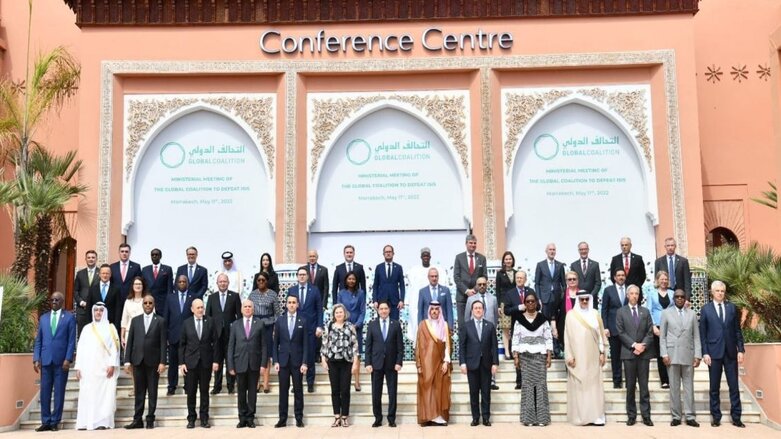Anti-ISIS Coalition affirms Iraq and Syria remain top priority; Rojava exempted from some Syria sanctions

WASHINGTON DC (Kurdistan 24) – Meeting in Morocco on Wednesday, representatives of the 85-member Defeat-ISIS Coalition re-affirmed that "ensuring the enduring defeat" of ISIS "in Iraq and Syria remains the number one priority for the Coalition," as the joint communique issued at the conclusion of their conference stated.
Even as the anti-ISIS Coalition reiterated its commitment to defeating ISIS in Iraq and Syria, describing the terrorist group as an "ongoing threat" in that area, it also noted that the danger posed by the terrorist group was growing in other parts of the world.
The meeting was held at the ministerial level. US Secretary of State Antony Blinken had been slated to co-host the conference, along with Moroccan Foreign Minister Nasser Bourita. However, last week Blinken tested positive for COVID, and he was replaced by Victoria Nuland, Undersecretary of State for Political Affairs.
Relaxing Sanctions on Rojava
In Morocco, Nuland announced that Washington would relax its sanctions on Syria to allow some foreign investment in northeastern Syria—i.e., Rojava, which is under the control of the Kurdish-led Syrian Democratic Forces (SDF).
"The United States intends in the next few days to issue a general license"—i.e., exemption from sanctions—"to facilitate private economic investment activity in non-regime held areas liberated from ISIS in Syria," Nuland said.
The idea is that boosting economic activity will improve the lives of those living in the self-administered areas and promote political stability, she explained.
One well-informed diplomat told Reuters that the sanctions exemption would apply to agriculture and reconstruction work but not to oil.
This is the first time the US has said that it will relax sanctions in northeast Syria in order to boost general economic activity, Reuters noted, although it previously issued two, much narrower, sanctions exemptions.
Same not Done in Iraq after 1991 Gulf War
This latest US move underscores a counterproductive rigidity in US policy toward Iraq following the 1991 Gulf War. After the devastating military defeat that Saddam Hussein suffered, President George H. W. Bush expected that he would be overthrown in a military coup.
Bush himself told that to British journalist David Frost in late 1995, on the eve of the fifth anniversary of the start of that war. "I miscalculated," Bush said." I thought he'd be gone." But as Saddam remained in power, the Bush administration resolved on a policy of economic sanctions and diplomatic isolation, a policy continued by the Clinton administration.
Although after the 1991 war, Saddam did not control the Kurdistan Region, it was, nonetheless, subject to the same punitive measures as the rest of Iraq. Those measures ended only after Operation Iraqi Freedom. The economic flourishing of the Kurdistan Region is a post-OIF phenomenon, as such a development was impossible as long as Kurdistan remained subject to US-enforced sanctions.
That the US has now decided to relax sanctions on those areas of Syria that the regime does not control suggests the same could have been done in Iraq long before 2003.
ISIS Threat Growing in Other Parts of the World
Wednesday's meeting was the first time the Defeat-ISIS Coalition met in Africa. In addressing the conference, Morocco's Foreign Minister stressed the growing threat in Africa.
"We remain lucid on the state of the ISIS threat, which has not diminished," Bourita said, noting that sub-Saharan Africa accounts for 48 percent, or 3,461, of the deaths caused by ISIS worldwide, The Washington Post reported.
"In recent weeks," ISIS affiliates in West Africa and the Sahel "have carried out several attacks," it said, as it noted a video recently released by Amaq, an ISIS-affiliated news agency, which showed terrorists executing more than a dozen Christians in Nigeria, ostensibly to avenge the deaths of previous leaders.
Turkish Foreign Minister Mevlut Cavusoglu was among the attendees in Morocco, and he called the timing of the conference "very important," Turkey's state-run Anadolu Agency reported.
Cavusoglu warned that ISIS attacks "have increased in Syria, Iraq, Afghanistan and the Sahel region in Africa," it said.
Kurdistan 24 has noted a recent surge of ISIS attacks in disparate areas of the world, including Afghanistan, Egypt, Israel, and Syria. It is unclear why that is happening, although, possibly, it relates to the crisis in Ukraine, which has diverted the attention of the major powers from almost every other issue.
ISIS claims to have a new spokesman—Abu Omar al-Muhajir—to replace its previous spokesman, whom it claims died in a US raid in early February, along with the group's leader, Amir Mohammed Sa'id Abd al-Rahman al-Mawla, who used the alias Abu Ibrahim al-Qurashi.
Read More: Al-Qurayshi vs. al-Mawla: What's in a name? What the US doesn't understand about ISIS
Of course, nothing that ISIS claims can be taken at face value without at least some independent corroboration.
We don't know if Muhajir is a real person or not. But in any case, "Muhajir" is not his real name. It is an alias, noteworthy perhaps for its meaning in Arabic: "immigrant."
ISIS media recently broadcast someone calling himself Muhajir, who described the Ukraine crisis as an "opportunity" and called for attacks in Europe. Such attacks have not materialized (or at least not yet), although the same opportunity would presumably exist elsewhere.
